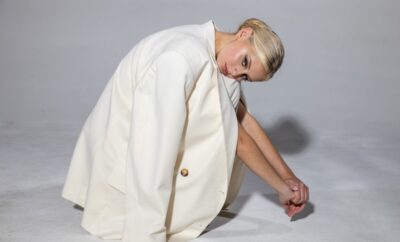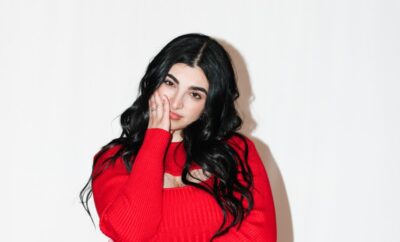Interviews
The Voice – Battle Rounds – Night Four
Q) The Battle Round has often been a big stumbling block for duos because each artist only gets to sing solo for so much time and then you have to split that up further because there are two of you. So I was wondering if you could talk a little bit about your strategy heading into the Battle and how are you planning to handle that?
Whitney: I think we kind of – we’re stronger together anyway. So I think going into the Battle we definitely, you know, we have to think about singing individually. But for the most part we like to stick together because that’s our kind of signature sound and that’s what we do best so we try to split it up as much as possible, but also, you know, just do our thing together.
Shannon: I will say we did struggle a little bit because we didn’t want to sound like back-up vocalists for Gabe. We wanted to make sure that we stood out and so we had to work really hard on just kind of making sure that we had moments where we shined a little bit. So we definitely – there were times we were nervous that we weren’t going to be doing enough to win our battle, but thankfully, I think Alicia was pleased with what we did. And we’re happy that she put us through to the next round.
Q) For Brendan and Bindi, I was wondering if you go into that Battle with any knowledge that there’s only one steal left. And if so, if that alters your strategy in any way? If that amps up the pressure in any way?
Bindi Liebowitz: Sure. I actually don’t remember. I know that, you know, there’s a lot of talk about how many spots are left. But then sometimes there’s misinformation or miscommunication. Kind of like a high school thing, like rumors. So I try not to pay attention to it. I didn’t want to go on stage hoping for a steal or, you know, hoping that, like, betting on steals or spots. I just wanted to go out there and have a really great performance and that’s what my method was. That’s exactly what I did. I went out and I just had a good performance. I had no idea how many spots were left or who had which steal. So that wasn’t really on my mind.
Q) Did you think you might have had a good opportunity to get stolen once the verdict came down?
Bindi Liebowitz: I was hoping so. I got really great feedback from all of the coaches during my blind audition. Miley and Alicia both spoke a lot more than what was showed on air for my audition. So I had faith that they believed in me. But you never know what they’re looking for for their team. You don’t know if it’s kind of an idea that they have for their final person or if it’s in terms of what works with the rest of the team. So I was hoping, but you just never know.
Brendan Fletcher: Sure. Yes. I agree with Bindi. I really didn’t know like how many steals were left. I think once you start worrying about that stuff it can really, like, maybe affect your performance. So I think we were just mostly concerned about just, like, putting on a good performance. And, you know, and like yes, just, like, killing the vocal. And just, you know, having a good time. And, like, because once you start worrying about that, you might, you know, you start to get nervous. And you start worrying about the game. It’s weird because, like, you’re taking something like singing and music and you’re putting it into an arena of, you know, where you’re going to be judged. And, like, your art is going to be quantified in a way. So it’s weird. Like you have to kind of separate yourself from the game at times. And I think that’s when the best performance comes out.
Q) Bindi, we saw Miley said she thought the song was too easy for you. I’m not sure what she meant by that. But she said something about, I guess it wasn’t challenging enough. And I want to know how you felt. Did you feel that way? And then, I’m glad you got stolen, and so now that you’re with Blake, what do you hope to accomplish? Like what do you want to show the audience about, you know, your talent? Maybe something that they thought – maybe something surprising about your talent. Like what you may expect from you.
Bindi Liebowitz: That kind of got a lot of feedback that she said that she felt the song was too easy for me. It’s really funny because the note at the end was really, really difficult for me to hit. And I was shocked that she thought that it appeared to be too easy for me. But I also kind of was okay with her saying that. If something was difficult for me and I can make it look easy, I feel like that’s me doing my job. And unfortunately, it doesn’t always, I guess – it’s not always fortunate. It doesn’t always work for you in the best ways. Because like Brendan said, you are taking something that’s usually just expressing yourself and putting it into a competitive kind of playing field. So whereas making something that’s difficult look easy would usually be a good thing, if it’s too easy and the other person looks like maybe they’re trying harder, I guess, that’s what I think she was trying to say. Then it would work against you. I was okay with her saying it. You know, criticism is criticism. You’re not always going to agree with it. You’re not always going to feel that it’s accurate. But I don’t think it came from a negative place. I think that anything that they say to us is just for us to work harder and become better artists. So I kind of stay neutral on all of it. I am really grateful that Blake stole me because it was him believing in me for a second time. I’m glad that there were no hard feelings or anything like that for me not choosing him for the Blinds. And really, I just need to prove that this is what I’m meant to do. But I don’t want to do anything but be an artist, but be a musician. And that I can take all the lessons learned from any genre artist and just kind of apply them to myself and be much better as an artist. So I just want to learn from him and kind of use that country knowledge and experience that he has and apply it to, I guess, the blues/soft rock kind of sound that I aim for. So it’s all about collecting the lessons on the way and then applying them to your performance.
Q) Austin, I was wondering, can you pinpoint anything that Blake has worked on you with up to this point that will help you further in the competition and in your career beyond the competition?
Austin Allsup: I think the biggest thing he’s already done for me is just turning around and giving me an opportunity to give this, you know, a whole run at this thing. And kind of just building me up, you know. Just telling me that I deserve to be here and – we haven’t done a whole lot of, you know, work on, like, technique or anything like that. He has worked with me on how to approach these songs and just kind of staying true to myself. He’s really pushing for me to just be me up on that stage and do what I’ve been doing for, you know, a long while now. So it’s pretty cool to have him really just as a friend, building me up, lifting me up and helping me believe in myself and know that I’m meant to do this so.
Q) And how did you feel about the song you were asked to perform?
Austin Allsup: I love that Moon Rising. It’s a great tune. I’ve actually, you know, sang it several times over the years playing in clubs and bars. And I’ve never played it at that tempo or down a half a step. I usually sing it a half a step higher than what we did. But we, you know, we kind of had to make it work for me and Preston so we brought it down a half a step and slowed it down a little bit. It’s a great tune. I would just rather kind of have another classic timeless tune to sing. I have Wild Horses by the Rolling Stones and Bad Moon Rising by Credence Clearwater Revival. So I don’t have a whole lot of room to complain about the song choices yet. So I’m loving it.
*CONFERENCE CALL*





You must be logged in to post a comment Login